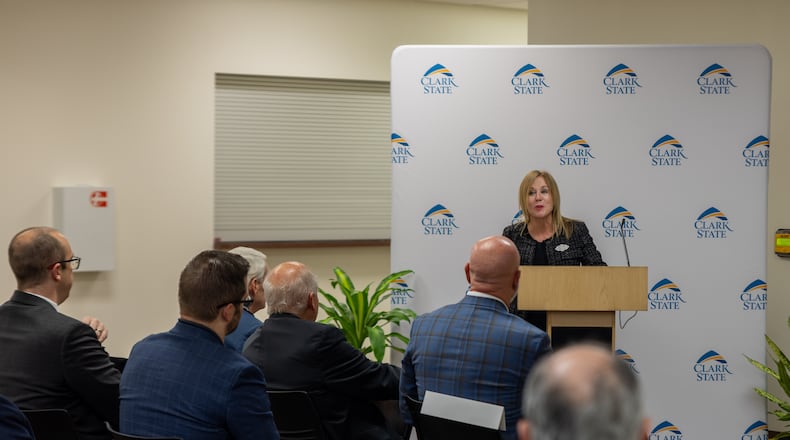The modeling and simulation program, in partnership with Infinity Labs, is the first of its kind, she said, and “builds on our academic and workforce strengths of collaborating with industry to ensure that students attain great jobs and stay in Ohio.”
“The defense industry is critical our region’s growth, and Clark State is honored to play a part in accelerating this growth,” Blondin said.
The announcement was made Friday at Clark State’s Greene County center in Beavercreek.
U.S. Rep. Mike Turner, R-Dayton, who represents Clark, Greene and Montgomery counties, said Clark State plays an important role in efforts by local, state and federal partners to build a robust defense economy in Ohio.
“Modeling and simulation analysis is a critical component of U.S. cyber infrastructure, and this grant from the Department of Education will go a long way in reinforcing Ohio’s position as a national leader in defense technology,” Turner said. “I look forward to seeing Clark State use this grant to expand educational opportunities for the next generation of cybersecurity experts.”
The technology uses virtual and augmented reality and develops skills needed in health care, engineering, entertainment, urban planning and aerospace fields, too, supporters said.
Adam Parrillo, Clark State’s dean of Business and Applied Technologies, said the degree will be new but builds upon knowledge and skills in Applied Engineering and Information Technologies. It will be designed to serve both students new to the field and existing workers looking to gain new skills.
The program will allow creation of “highly accurate digital models and precise simulation criteria,” Parrillo said, which in turn will create and manage resources more efficiently. “This progress is especially important for managing fleets from a military defense standpoint and enhances commercial manufacturing and maintenance in many areas,” he said.
With the money Clark State will be able to obtain the physical and human resources to build this program. The college is developing short-term, foundational curriculum pathways with a goal of sequences for the new program ready for students in the 2024 fall semester, a release said.
Clark State’s modeling and simulation programs will be technician focused and offer an associate’s degree, differing from most current efforts targeted for a bachelor’s degree or higher, or for a certificate meant to be paired with another degree.
Epsilon C5I Systems advised Clark State on the demand for modeling and simulation workers in the Dayton region.
“This skill set is critical to national security mission needs, current and emerging threats,” said Mike Ronayne, director of Intelligence Services at Epsilon C5I Systems. “There are many customers in the government and industry who will benefit from an increase in workforce availability.”
Epsilon will assist Clark State on academic course development.
Infinity Labs and Clark State in 2022 signed a Memorandum of Understanding on the importance of regional workforce development, student professional development and curriculum development related to modeling and simulation.
Jason Molnar, co-founder and chief strategy officer at Infinity Labs, said the demand for modeling and simulation expertise “is an ever-growing requirement in our world of digital engineering solutions.” Molnar added: “Simply stated, there is more work than there are technically trained and qualified people to complete it.”
Molnar said Infinity Labs sought out an academic partner to help build the Miami Valley’s digital workforce.
“Clark State leadership supported the plan and vision from the onset,” he said. “Together, we’ll be growing highly technical talent for immediate employment in, at or around Wright-Patterson Air Force Base, and doing our part in keeping Ohio the No. 1 state for military and federal missions.”
